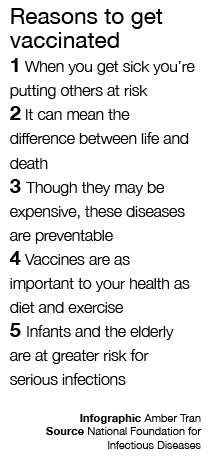Opinions: School-required immunizations necessary
Students face health risks without vaccinations
 The recent news of a tuberculosis case at Park highlights why there is a need for schools to require student immunization.
The recent news of a tuberculosis case at Park highlights why there is a need for schools to require student immunization.
Vaccinated students have a lowered risk of catching the disease they’ve been immunized for, according to the U.S. Department of Health and Human Services.
People must be vaccinated for their own health, as well as the health of others. Vaccines provide protection against potentially deadly diseases.
For example, people often think of chickenpox as a harmless childhood disease. But, prior to the varicella vaccine, chickenpox resulted in 11,000 hospitalizations per year in the United States.
In 2012, there were fewer than 800 chickenpox-related hospitalizations in the United States, according to the Center for Disease Control and Prevention (CDC).
Widespread vaccination also protects those who are not eligible for vaccination, such as infants and pregnant women, via community immunity (herd immunity).
When a certain percentage of a population receives immunization, even those who are not immunized are protected.
For herd immunity to work, however, between 80 and 90 percent of the population needs to be immunized.
Herd immunity is especially important for preventing contagious diseases from spreading and protecting those susceptible in the high school population.
There is evidence vaccines work in eradicating disease, but only if immunization programs are maintained. For example, Japan was effective in eliminating whooping cough in the 1970s because of the pertussis vaccine.
However, because whooping cough became so rare, only 10 percent of Japanese infants were immunized in 1976, and whooping cough returned in a major epidemic in 1979.
The Japanese government re-introduced an immunization campaign and whooping cough was again eliminated. It has not returned because of continued immunization.
There are three reasons people oppose vaccination, but none are persuasive. First, vaccines often come under fire for allegedly causing Autism Spectrum Disorder.
However, no scientific research supports this “alternative fact.”
Since 2003, the CDC funded or conducted nine studies to understand whether there is truth behind vaccine-caused autism. These reports concluded that no such link exists between any vaccine ingredients and autism.
Second, some parents argue against vaccination because they supposedly contain mercury, a poisonous ingredient. However, current vaccines do not contain mercury, according to the CDC.
Third, some people of certain faiths, such as Christian scientists, oppose vaccination on religious grounds. While the U.S. government allows free exercise of religion, it is not unlimited.
By not vaccinating their children, parents act negligently toward the child’s own health.
Even worse, unvaccinated children can harm public health by detracting from herd immunity.
In a high school sickness spreads like a wildfire. Imagine if all those people out with a cold were in fact out because they weren’t immunized against mumps, measles, whooping cough or chickenpox.

Yo it’s pretty neat that I’m a managing editor this year! One of my favorite activities is to eat Wacky Mac on a porch on Friday afternoons. My favorite...












